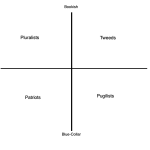
Allow me a brief meditation on a thing I’ve learned since becoming a dad.
Were I a single man, without children, I’d probably spend a lot of time reading in my comfy armchair (technically, I do spend a lot of time doing that, but I’d spend even more). For the sake of argument, let’s say we’re talking about three hours in the evening. That’s a good thing, and it brings me joy.
Ever since our son came along, though, our evenings have looked rather different. There’s the long stroller walk after his second nap, the flurry of cooking or heating up some dinner that everyone can eat (alas, cold pizza is no longer an option), supper, after-supper playtime, and often a bath. And usually, before it’s his bedtime, I get about half an hour or so to sit and read aloud with him—often reading and rereading Goodnight Moon, The Very Busy Spider, Hop on Pop, and other old standbys.
And I love doing it. That half hour of reading with my son will, almost without fail, bring me, personally, far more joy than three hours of reading alone in my basement. It also will bring my son more happiness than if he were left alone. And it will benefit my family as a whole by settling the little guy down for bed and freeing up my wife to do other tasks.
I think that when Christians and others talk about concepts like the “common good,” this is the sort of thing they’re getting at. The “good” that obtains in this situation is undoubtedly different than the “good” of me sitting in my armchair reading alone all evening, but it is fuller and deeper, and I don’t resent having to scale back that prior good.
For what it’s worth, a larger point that follows from this is that I wouldn’t have really understood this idea before I was in the midst of parenting. Specifically, there seem to be ways in which human beings were created to flourish that aren’t always readily recognizable “from the outside”; the meaningfulness and beauty of them is something that needs to be lived into.
But because of the “nonobviousness” of these ways of flourishing, it’s not surprising that many millennials have elected to opt out: I could never settle down and have kids. They’re so much work. I’d lose so much time. Well, yeah, there’s a lot of work involved. Nobody who’s taken care of a toddler for even an hour would disagree with that. And some days are harder than others, of course.
But the critical point that gets lost in this framing is that happiness doesn’t have to be zero-sum. More specifically, implicit here seems to be the notion that “if I’m helping meet someone else’s needs, my needs aren’t being met.” That certainly can be the case, but it doesn’t need to be; your own efforts can contribute to the good of a relationship that, ultimately, brings you far more joy than if you hadn’t made the initial commitment.
I’ve made this point before, but I’ve often thought that the way some conservatives talk about things like the “common good” can be very off-putting, as if the “good of all” needs to be a sort of metaphysical steamroller that obliterates individuality and press-gangs everyone into a state of misery. This is not only terrible messaging, it’s wrong. A “horizontal” unity reduces everyone to the least common denominator, but a “vertical” unity is one in which the goods of the individual and the many overlap—and traditionally speaking, appeals to the common good are appeals to the latter. On this view individual and communal goods, properly understood, aren’t actually opposed; they can only be pitted against one another through error or misjudgment.
The family, in short, is the exemplar case of the common good. And it is so very worth it.












